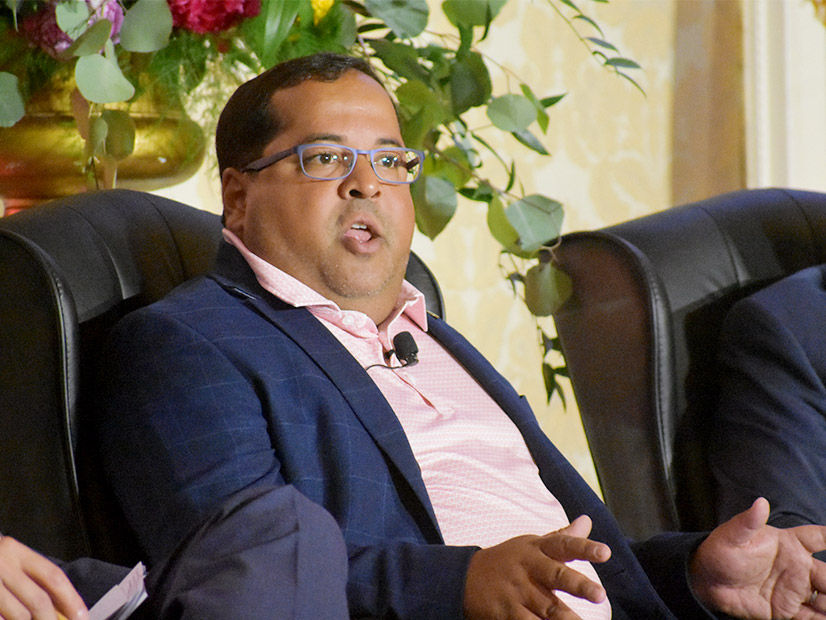Neil Chatterjee’s four years at FERC, most of them at the helm, transformed him from playing the partisan game of thrones to advocating for a price on carbon as a way to solve the problem of climate change.
A Republican who worked as an adviser to Sen. Mitch McConnell (R-Ky.) prior to being appointed to FERC by President Donald Trump, Chatterjee maintains he has always thought climate change is a serious problem. But in recent interviews about his time at the commission — including one with RTO Insider last week, he has repeatedly expressed regret about his first stint as chair.
Chatterjee’s term ended June 30, and he resigned Aug. 30 to join law firm Hogan Lovells. President Biden last week announced he intends to nominate D.C. Public Service Commission Chair Willie Phillips to be his successor. (See Biden to Nominate Phillips to FERC.) Chatterjee spoke to RTO Insider on Sept. 7, prior to Biden’s announcement.
“It took me a while to grow into the job,” Chatterjee said. “In my initial days with the commission, I really struggled to make the transition from partisan legislative aide to independent regulator.” That was most publicly visible, he said, when he “admittedly mishandled” a proposal from Energy Secretary Rick Perry in late 2017 to order RTOs and ISOs to compensate generators for their on-site fuel costs. At the time, Chatterjee praised Perry’s “bold leadership” and was supportive of the proposal, as it would have aided struggling coal communities in his native Kentucky.
“That was a serious issue that I injected a political element into; that was a mistake,” he said last week. “I think I got thrown into the deep end of the pool without knowing how to swim. [So] I actually think I grew from that experience.”
After former FERC Chair Kevin McIntyre relinquished his leadership role for health reasons in 2018, Chatterjee said it was McIntyre who was instrumental in that growth. With McIntyre as chair and a full complement of five commissioners, Perry’s proposal was unanimously rejected. Reappointed chair after McIntyre resigned, Chatterjee told reporters that McIntyre “could not be more strenuous in saying that politics could not be allowed to interfere with the work of the commission.” (See Returning Chair Pledges to Protect FERC’s Independence.)
After the experience of the Perry proposal and having learned from McIntyre’s leadership, Chatterjee said he became “a more focused regulator [with] a team around me that would really give me the soundest advice.” He began to increasingly speak out about market-based solutions to climate change, culminating in a policy statement in late 2020 inviting states to introduce carbon pricing in RTOs. (See FERC: Send Us Your Carbon Pricing Plans.)
That move ultimately cost him the chair. Shortly after the Washington Examiner published an article titled “Trump appointee becomes leading climate problem solver,” Trump fired Chatterjee and promoted Commissioner James Danly, who served in the top job until Biden took office and appointed Commissioner Richard Glick. According to Chatterjee, his post-chair tenure “was some of the most fun that I had at the commission. … I no longer had the burdens of the chairmanship to contend with, but I was invested in making sure there was a successful transition to Chairman Glick.”
Carbon Price Advocate
Along with Hogan Lovells, where he will advise clients on energy markets, Chatterjee also joined The Climate Leadership Council and its lobbying unit, Americans for Carbon Dividends. According to the organization, “Chatterjee will draw on his deep experience to help the council refine the details of its comprehensive policy initiative to price carbon emissions and return the revenues to all Americans.”
“I’ve seen firsthand the difficulty of trying to navigate a patchwork of state policies while maintaining market efficiencies,” he said. “I’ve really come to the conclusion that a price on carbon is the most effective way to drive down emissions and bridge this gap between” state policies and markets.
It’s safe to say many economists would agree with him, but the idea has not gained traction in Congress. Chatterjee said he hopes to change that.
“Part of it is looking at what are the alternative options are,” he said. “When compared to alternative solutions that are more onerous and may lead to greater threats to reliability and may not be efficient from a market standpoint, I think you may see some more interest” in a carbon price.
He’s also “cautiously optimistic that we’re pretty close to seeing an RTO or an ISO come to FERC” with a carbon pricing proposal. If approved, “I am of the belief that such an approach would lead to market efficiencies and a reduction in carbon [emissions]. So it’s possible that having that kind of a lab experiment in an RTO or ISO, if it proves to be successful … that could be the type of thing that helps build public support; we could point to an example. … Some have deemed that a ‘baby step.’ … Let’s take the baby step and see what happens.”




